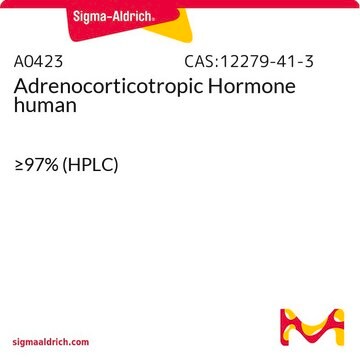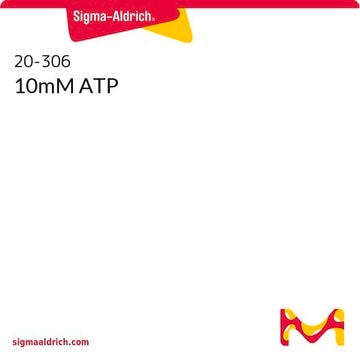A7699
Adenosina 5′-trifosfato disodium salt hydrate
BioXtra, ≥99% (HPLC), from microbial
Sinónimos:
ATP disodium salt
About This Item
Productos recomendados
biological source
microbial
product line
BioXtra
assay
≥99% (HPLC)
form
powder
impurities
≤0.1% inorganic P
≤3% solvent content
pKa
(1) 4.0, (2) 6.5
solubility
H2O: 50 mg/mL, clear, colorless
anion traces
chloride (Cl-): ≤0.05%
cation traces
Al: ≤0.005%
Ca: ≤0.01%
Cu: ≤0.001%
Fe: ≤0.05%
K: ≤0.01%
Mg: ≤0.005%
NH4+: ≤0.05%
Pb: ≤0.001%
Zn: ≤0.0005%
λmax
259 nm
storage temp.
−20°C
SMILES string
O.[Na+].[Na+].Nc1ncnc2n(cnc12)[C@@H]3O[C@H](COP(O)(=O)OP([O-])(=O)OP(O)([O-])=O)[C@@H](O)[C@H]3O
InChI
1S/C10H16N5O13P3.2Na.H2O/c11-8-5-9(13-2-12-8)15(3-14-5)10-7(17)6(16)4(26-10)1-25-30(21,22)28-31(23,24)27-29(18,19)20;;;/h2-4,6-7,10,16-17H,1H2,(H,21,22)(H,23,24)(H2,11,12,13)(H2,18,19,20);;;1H2/q;2*+1;/p-2/t4-,6-,7-,10-;;;/m1.../s1
InChI key
NTBQNWBHIXNPRU-MSQVLRTGSA-L
¿Está buscando productos similares? Visita Guía de comparación de productos
Application
Biochem/physiol Actions
Storage Class
11 - Combustible Solids
wgk_germany
WGK 2
flash_point_f
Not applicable
flash_point_c
Not applicable
ppe
Eyeshields, Faceshields, Gloves, type N95 (US)
Certificados de análisis (COA)
Busque Certificados de análisis (COA) introduciendo el número de lote del producto. Los números de lote se encuentran en la etiqueta del producto después de las palabras «Lot» o «Batch»
¿Ya tiene este producto?
Encuentre la documentación para los productos que ha comprado recientemente en la Biblioteca de documentos.
Los clientes también vieron
Protocolos
ZIC®-cHILIC is a densely bonded zwitterionic stationary phase with phosphorylcholine functional groups covalently attached to silica.
ZIC®-cHILIC is a densely bonded zwitterionic stationary phase with phosphorylcholine functional groups covalently attached to silica.
ZIC®-cHILIC is a densely bonded zwitterionic stationary phase with phosphorylcholine functional groups covalently attached to silica.
ZIC®-cHILIC is a densely bonded zwitterionic stationary phase with phosphorylcholine functional groups covalently attached to silica.
Nuestro equipo de científicos tiene experiencia en todas las áreas de investigación: Ciencias de la vida, Ciencia de los materiales, Síntesis química, Cromatografía, Analítica y muchas otras.
Póngase en contacto con el Servicio técnico










